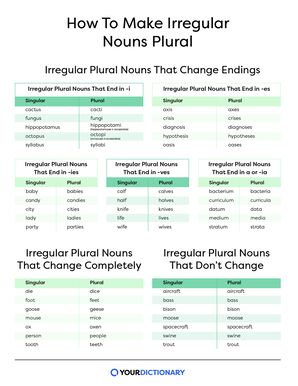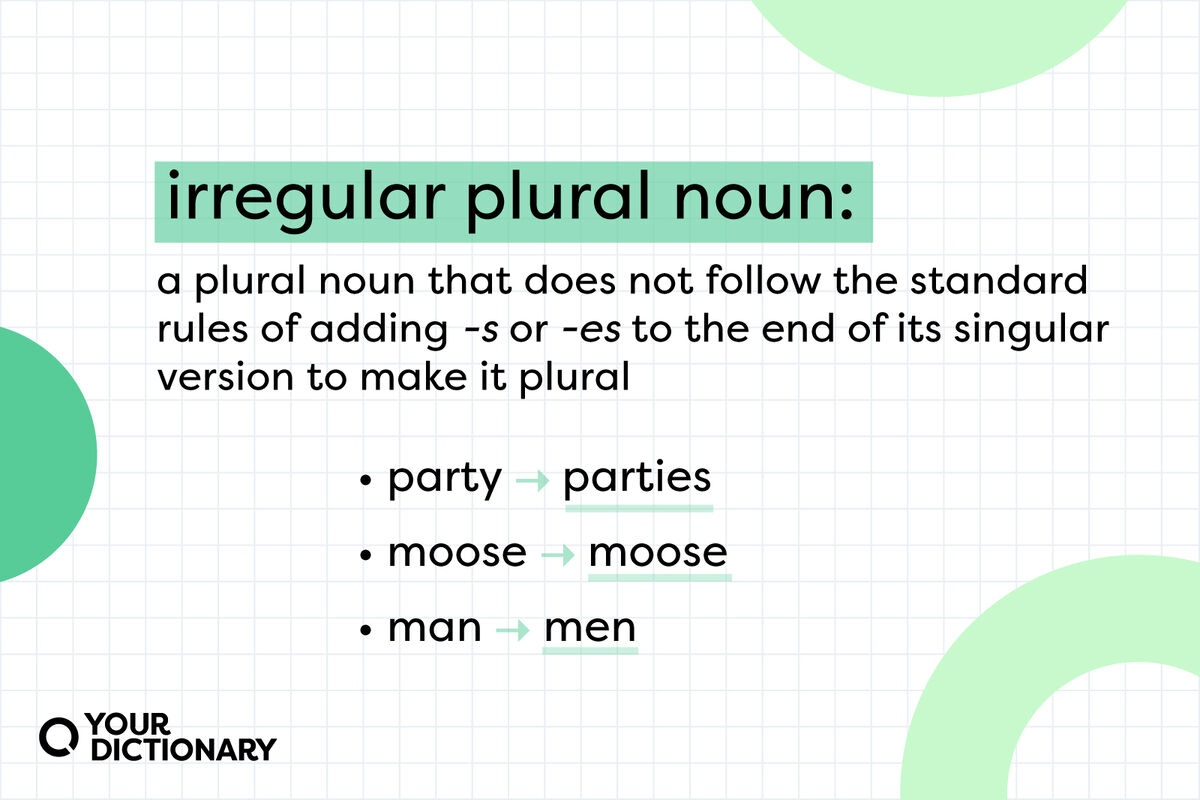

What do James Dean and moose have in common? They don’t like to follow the rules. While James Dean may have been a rebel without a cause, moose (and deer, and mice, and octopuses) refuse to follow standard grammar rules. But no matter how cool you look on a motorcycle, you’ve got to know how to spell irregular nouns — because nothing’s cooler than proper spelling.
What Is an Irregular Plural Noun?
For most plural nouns in English, adding "s" or "es" to the end of the word changes a singular noun into a plural noun (friend becomes friends, wristwatch becomes wristwatches, and so on). But with irregular plural nouns, that’s not the case.
Examples of irregular plural nouns include:
- parties
- mice
- moose
- scissors
- men
- wives
- tomatoes
Irregular plural nouns either change their endings (such as party to parties) or stay the same as their singular forms (such as moose to moose). It may seem like they’re just breaking grammar rules, but really, irregular plural nouns are just following different spelling rules.
List of Irregular Plural Nouns
Just because they’re called irregular doesn’t mean these plural nouns are uncommon. In fact, you’ll find many of them in your everyday speech.

Rules for Changing Irregular Plural Nouns
Many irregular nouns change their endings when they move from singular to plural. Once you know how each noun’s spelling changes, you’ll make fewer spelling mistakes.
Irregular Plural Nouns That End in "ies"
If the word ends in a consonant plus "y," then change the "y" to an "i" and add the letters "es.”
|
Singular Noun |
Plural Noun |
Example Sentence |
|
baby |
babies |
Four babies were born this week. |
|
candy |
candies |
Those candies are too sour. |
|
daisy |
daisies |
We ran through a field of daisies. |
|
lady |
ladies |
Three old ladies walked by. |
|
party |
parties |
How many parties are you attending? |
When a word ends in a vowel and “y” (such as monkey or day), you just add an “s” to the end (monkeys, days).
Irregular Plural Nouns That End in "ves"
For most nouns that end in "f" or "fe," drop the "f" or "fe" and add "ves."
|
Singular Noun |
Plural Noun |
Example Sentence |
|
calf |
calves |
Baby calves stay near their mothers. |
|
half |
halves |
Two halves make a whole. |
|
knife |
knives |
These knives are too dull. |
|
life |
lives |
Do cats really have nine lives? |
|
loaf |
loaves |
I made two loaves of banana bread. |
|
wife |
wives |
Henry VIII had six wives. |
When a noun ends in a double vowel and an “f” (such as roof or proof), it doesn’t change to “ves” in the plural form. Instead, just add an “s” to the end (roofs, proofs).
Irregular Plural Nouns That End in "i"
For many words that end in “us,” change the “us” to an “i” (especially if it comes from a Latin word). There are exceptions to this rule, and it’s becoming more acceptable to add “es” instead of changing to “i” in some cases — especially if the word has a Greek root.
|
Singular Noun |
Plural Noun |
Example Sentence |
|
cactus |
cacti |
We replaced our rose bushes with cacti. |
|
fungus |
fungi |
Mushrooms and mold are both fungi. |
|
hippopotamus |
hippopotami (hippopotamuses is acceptable) |
Both hippopotami love eating pumpkins. |
|
octopus |
octopi (octopuses is acceptable) |
Three blue octopi swam by us. |
|
syllabus |
syllabi |
There’s a stack of syllabi on the teacher’s desk. |
Irregular Plural Nouns That End in "a" or "ia"
Another Latin spelling convention turns singular nouns that end in "um" into plural nouns that end in “ia.”
|
Singular Noun |
Plural Noun |
Example Sentence |
|
bacterium |
bacteria |
Millions of bacteria infected the injury. |
|
curriculum |
Teachers organize their curricula before school begins. |
|
|
datum |
Have you examined all the data? |
|
|
medium |
media |
I create art in many different media. |
|
stratum |
strata |
There are four social strata in this society. |
Irregular Plural Nouns That End in "es"
Some irregular plural nouns do end in "es" — but you don't just add it to their endings. For many words that end in “is,” change the “is” to an “es.” These are also pronounced differently (ees at the end of each word, not es)
|
Singular Noun |
Plural Noun |
Example Sentence |
|
axis |
axes |
All planets rotate on axes. |
|
crisis |
crises |
Two crises were happening at once. |
|
diagnosis |
diagnoses |
The patient has at least five diagnoses. |
|
hypothesis |
hypotheses |
Scientists have several hypotheses. |
|
oasis |
oases |
Day spas can be oases in a busy day. |
Irregular Plural Nouns That Change Completely
Parties, bacteria, and cacti at least follow their own rules. But certain irregular plural nouns, such as children or teeth, don’t follow any grammatical rules at all. The only way to get them right is to memorize them.
|
Singular Noun |
Plural Noun |
Example Sentence |
|
child |
children |
How many children do you have? |
|
die |
dice |
Roll both dice on your next turn. |
|
foot |
feet |
Both feet hurt after the long hike. |
|
goose |
geese |
At least ten geese chased me around. |
|
man |
men |
Four men worked on the project. |
|
mouse |
mice |
Are there any mice in your walls? |
|
ox |
oxen |
It took eight oxen to pull the heavy cart. |
|
person |
people |
How many people came to the party? |
|
tooth |
teeth |
Lily lost three teeth this weekend. |
Irregular Plural Nouns That Don’t Change at All
Just as you were mastering the irregular plural nouns that change their endings, here come the nouns that don’t change at all. The good news is, you only need to learn one spelling — the bad news is, there’s no rule about which words follow this rule.
Uncountable Nouns
Uncountable nouns don’t have plural forms. They usually describe an uncountable quantity of something (such as air or love).
|
Singular Noun |
Plural Noun |
Example Sentence |
|
hair |
hair |
She cut her hair before the dance. |
|
grass |
grass |
Did you water the grass? |
|
happiness |
happiness |
All I care about is your happiness. |
|
independence |
independence |
Teenagers value their independence. |
|
mud |
mud |
Please don’t stomp in the mud. |
Unchanging Nouns
Many nouns have the same singular and plural forms, especially species of animals. You can only tell that they’re plural by reading the context clues in the rest of the sentence.
|
Singular Noun |
Plural Noun |
Example Sentence |
|
aircraft |
aircraft |
Four aircraft zoomed overhead. |
|
bison |
bison |
Many bison roam these prairies. |
|
deer |
deer |
Three deer crossed the road. |
|
fish |
How many fish did you catch? |
|
|
moose |
moose |
Both moose stopped to drink from the lake. |
|
spacecraft |
spacecraft |
Three spacecraft launched on the same day. |
|
swine |
swine |
Look at all the swine at this farm. |
|
trout |
trout |
We caught several trout this morning. |